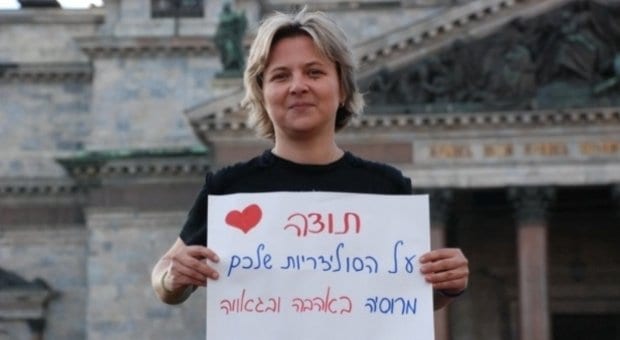Same-sex families and their children is the group currently under the most pressure in Russia, says Polina Andrianova, of the St Petersburg LGBT organization Coming Out.
Those families will have to leave the country to ensure their safety if lawmaker Alexei Zhuravlev’s measure to deprive gay people of their parental rights is enacted, Andrianova says.
“It occurred to me that since we have a law explicitly prohibiting the promotion of homosexuality among minors, the Family Code should be amended in such a way that if a husband or a wife professes a nontraditional sexual orientation, they should be deprived of their parental rights,” Zhuravlev said in a Sept 5 interview with Russian news portal slon.ru.
Andrianova’s concern for LGBT families echoes that of Russian-born activist and journalist Masha Gessen, who recently said the time has come for LGBT people to seek asylum abroad.
Still, Andrianova says she doesn’t believe that nothing can be done within Russia and doesn’t feel that all LGBT people should leave.
“It is important not to forget that there are activists working in this country to support LGBT people, to inform society, and to make the lives of LGBT better,” she told Xtra by email. She says the LGBT movement has become stronger over the last couple of years and to call for a mass exodus could demoralize people and weaken the movement, making it more difficult to support those still living in Russia.
Andrianova acknowledges that it’s unrealistic and unfair to expect all LGBT people to be fighters.
“Those who can and want to should stay, fight, and that is exactly what we are doing. Those who are under direct threat that cannot be mitigated should probably leave.”
She says the response of LGBT people to the passage of anti-gay laws varies. “There are many who are scared and intimidated. These are people who just want to live their lives in peace, not being afraid for themselves and their loved ones. There are others who, in response to the repression and homophobia on the state level and in society have become more ready to openly defend their rights by joining street actions, by defending their rights openly in courts.”
Natalia Tsymbalova is coordinator of the Straight Alliance for LGBT Equality (Russia).
Recently, she says, there is a growing cadre of young, educated people, particularly among liberal and civil activists, who are ready to support the LGBT community, in spite of — and even because of — the homophobic policies of the Russian government. “Among intelligent people in Russia, to be homophobic is gradually becoming indecent,” she suggests.
Tsymbalova believes the ongoing calls for a Sochi Games boycott and the attendant global protests are infuriating Russian President Vladimir Putin.
“[The authorities] are now doing their best to bring down this wave,” says Tsymbalova, who supports a Games boycott, adding that Putin’s constant assertions that there’s no discrimination against gays demonstrates his concern about global condemnation against the anti-gay legislation.
“Of course, they can take it out on us, as they always do. But I hope that in the end the internal and external pressures will force them to make concessions,” Tsymbalova says.
Andrianova says international pressure is helpful if the messaging is “thought through carefully,” adding that it’s not helpful to “attack Russia — as opposed to the Russian government or policy — or to focus only on LGBT rights violations.” She notes that the general human rights environment in the country is “rapidly deteriorating.”
Andrianova, who doesn’t favour a boycott, believes the Games will be the “safest place” from the nationwide anti-gay gag law.
“We call for organizations and individuals who are attending the Games to exercise freedom of expression and freedom of assembly, and to not fall accomplices to the homophobic policies by censoring own beliefs, statements, and identities.”
But Andrianova says boycotting products is a good idea if they tie directly to the Russian government, pointing to Lukoil — with gas stations in more than 40 countries, including the US, and Kaspersky Anti-Virus, as examples.
Andrianova says there is “quite a consolidated opinion” regarding strategy among most major LGBT organizations involved in movement building on the ground in Russia. She says the network, comprising 16 regions of Russia, collaborates fairly regularly.
Tsymbalova says there is an ongoing information war on both sides of the conflict.
“And as it is in any war, the question is: who will win?” she says. “It is necessary to protest. Boycott, saying it out loud, or come here and talk to [the authorities] about the same in their face. All of this is good for the common cause.”


 Why you can trust Xtra
Why you can trust Xtra


